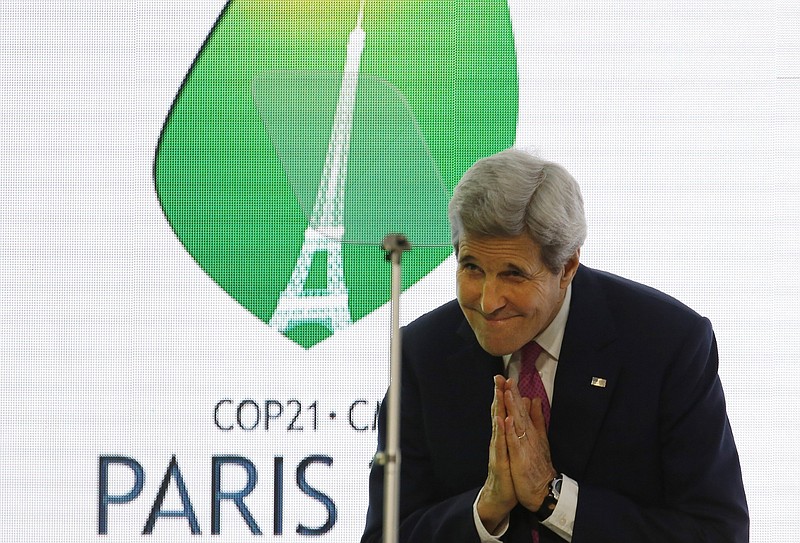By now we've all learned President Donald Trump is going to follow his instincts.
They may not be the same instincts he had on the campaign trail, or even this morning, but he's not going to follow a prescribed or predictable path.
Thus, the most reputable experts, the most cited pundits and his most trusted sources won't necessarily affect his decision-making.
On the Paris Climate Agreement, though, he remained true to his campaign promise and on Thursday pulled the United States out of the 2015 deal. It's another promise his supporters can say he kept.
"I was elected to represent Pittsburgh, not Paris," Trump said.
The agreement would have forced the U.S. to reduce its fossil fuel emissions from its 2005 level by nearly 30 percent by 2025. As of 2015, the country already was on a path to reduce its fossil fuel emissions by 17 percent.
Yet, despite Trump's decision, he said he was open to "negotiate back into Paris or a new deal, a new deal that protects the country."
It would have to be a deal, he said, with better terms for the U.S.
However, Trump said Thursday and should reiterate in the coming days and months the country's commitment to curbing various emissions.
The U.S., he said, will remain "the cleanest, most environmentally friendly nation on earth" and "the world's leader in environmental issues."
But Trump should go further. He should detail how specific industries, on their own accord and as part of what they see as best practices, have reduced their emissions. He should name individual companies and agencies and detail how they have reduced emissions with clean coal, nuclear power, natural gas, and wind and solar power as they become cheaper and do not have to be subsidized by the federal government.
In general, he should continue to spell out that it's important to take care of the environment but that it must be done reasonably and not by force.
In his Rose Garden speech, Trump explained why he doesn't believe the agreement is good for the country, spelling out that it demands the U.S. deposit $3 billion into the Green Climate Fund (though not all countries are so obligated), which is supposed to assist developing countries in adapting to climate change. It also allows other large countries to increase their emissions but not the U.S.
He also explained and should continue to hammer that the agreement is open-ended with no termination date, would increase electricity costs for a family of four by at least 13 percent a year and would cause a $3 trillion hit to the economy in lost gross domestic product.
Trump could have explained but didn't how such an agreement with its commitments should have been submitted to the Senate as a treaty, but that's beating a dead horse from the Obama years when the former president couldn't get unpopular legislation passed by Congress and had to resort to executive orders and agreements.
Most importantly, he hit on but should clarify further what even extreme environmentalists know - the agreement will have little impact on the planet's temperature. Massachusetts Institute of Technology's Joint Program on the Science and Policy of Global Change projected that if every U.S. business was closed down and all carbon dioxide-emitting activity in the U.S. stopped, the result would be less than two-tenths of a degree Celsius reduction in global temperature.
Former Secretary of State John Kerry admitted as much during the agreement negotiations.
"If all the industrial nations went down to zero emissions - remember what I just said, all the industrial emissions went down to zero emissions - it wouldn't be enough, not when more than 65 percent of the world's carbon pollution comes from the developing world," he said.
Sen. James M. Inhofe, R-Okla., issued a white paper saying essentially the same thing about the agreement's "empty promises" and lack of "meaningful impact on the climate."
"The problem with international climate change agreements is that they ignore basic economic and political realities and therefore are doomed to failure," he wrote.
Breathless national and international media outlets and leftist politicians have written and broadcast - and will continue to - what a horrible idea it is for the U.S. to pull out of this agreement. With anxiety bordering on hysteria, they have alleged embarrassment and lack of respect will fall on the country. Why, the country will be isolated, an island unto itself, they say.
Hardly.
Trump will be criticized, but those who live by the god of environmentalism didn't vote for him in the first place, so he's losing nothing there. And the U.S. is too much of a global power to believe other countries would or could refuse to work with us. Indeed, withdrawing from the agreement may make the United Nations and other countries aware the U.S. can and will resist diplomatic pressure to protect its own interests.
The decision is, Environmental Protection Agency Administrator Scott Pruitt said following Trump's remarks, evidence of the "restoration of American economic independence."
And after seeing the country wane in power and influence over the last eight years, that might be just what the other countries need to see.
